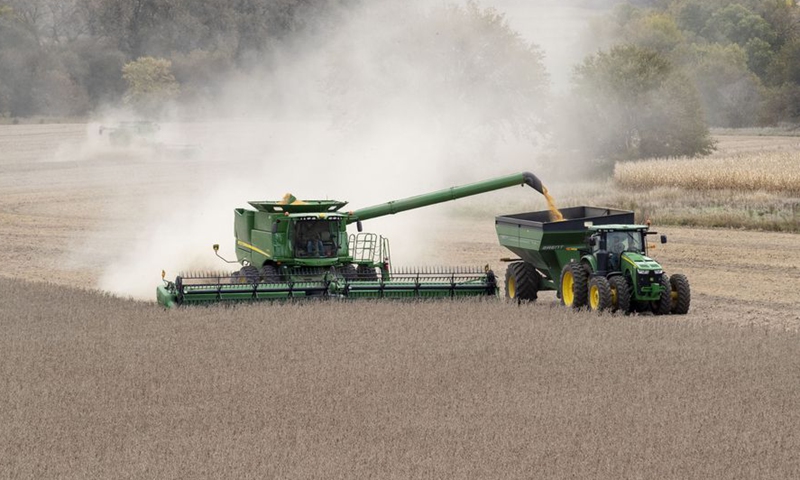China-US phase one trade deal on track, farm purchases continue
Source: Global Times Published: 2020/9/9 21:12:49

A combine and a grain cart work in a soybean field of Pellett family's farm in Atlantic, a small city in Iowa, the United States, Oct. 16, 2019.Photo:Xinhua
The phase one trade agreement between China and the US seems to be on track, as China continues to purchase more US agricultural products, even as bilateral tensions in a wide range of areas continue to worsen.
In the latest sales activity, Chinese firms bought 664,000 tons of US soybeans, the US Department of Agriculture (USDA) said on Tuesday. That was the largest daily purchase since July 22, Reuters reported. Additionally, China made a purchase of 101,600 tons of US corn, the USDA said.
The latest purchases came after top Chinese and US trade officials held a phone call late last month over the phase one deal and, Chinese officials said, agreed to create the conditions and atmosphere to continue pushing forward the implementation of the trade deal.
Under the phase one deal, China has committed to increase its purchases of US agricultural and other products by $200 billion over the 2017 level. But Chinese officials have repeatedly called for the US to create a better environment for the deal's implementation, as the US stirred up tensions with China in range of areas from a trade war to technology clampdown to the South China Sea.
US President Donald Trump still needs the phase one deal for his reelection, as the US is grappling with natural disasters and social unrest, said Gao Lingyun, an expert at the Chinese Academy of Social Sciences who closely follows the China-US trade relationship.
"As far as China is concerned, there is nothing new," Gao told the Global Times, adding that China has made it clear that it would work to implement the deal, but the US must work with China.
In an interview on Tuesday, US Secretary of Agriculture Sonny Perdue expressed optimism about the phase one deal, noting that China has "really stepped up" over the last six weeks.
"You've seen record corn shipments and even bean shipments here recently. I believe they have the capacity, China imports a lot of things," Perdue said in an interview, according to a transcript that was published on the website of the US Embassy in Beijing.
Posted in: MARKETS,BIZ FOCUS